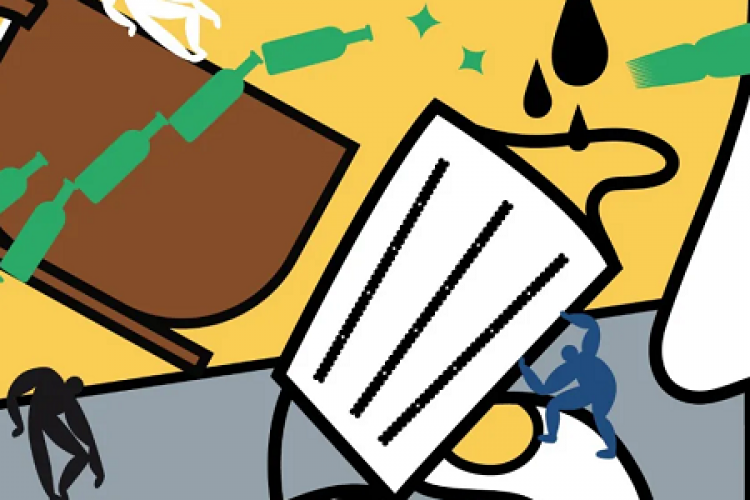Ich Bin Ein Beijinger: Blasting Canons
Eight years ago, my band Chunqiu (Spring & Autumn) played at the Snow Mountain Music Festival in Lijiang. The day before the festival kicked off, we sound-checked at the venue, an alpine meadow 45 minutes by car above town. Then we shared a minibus back down to Lijiang with the band Brain Failure, one of China’s best-known Punk bands. At first there was a bit of awkwardness.
Beijing’s Metalheads and Punks have never really mixed that well. Some years earlier there had been a spell of bad blood, culminating in a couple of fist fights at rock clubs long since defunct. As we stood around waiting for the driver, I noticed that we were all clad in leather jackets and toting vinyl gig bags for our guitars. The difference was that while our jackets and gig bags were all unadorned, Brain Failure’s were covered in patches, buttons, and stickers. We all climbed into the minibus, separated by the aisle and by our genre allegiances.
For the first ten minutes of the ride, no one said anything. And then, as we bounced down the rutted road, Brain Failure guitarist Wang Jian turned to me and asked, “Do you like Marshall amps?” I was caught momentarily off guard, but managed to tell him that no, I didn’t. (Too much thin high-end, and they lack body, though certain guitars do sound good through them.) My fellow Chunqiu guitarist jumped in with his take, and then so did Brain Failure’s bassist. Soon we were all chatting away happily about guitars, amps and various stomp boxes.
“I didn’t realize you Punk guys cared much about gear,” I said. Not many did, Wang Jian agreed, but he was an exception. “Actually, I listen to a lot of Metal,” he said. “And I love Steve Vai.” It was a startling admission. Steve Vai, if you aren’t familiar with him, is the embodiment of the over-the-top guitar heroics you’re supposed to revile as a Punk. Wang Jian, it turns out, was a closet shredder, but his chops weren’t put to use; besides, they would have been badly out of place in a three-chord Punk band where a guitar solo is supposed to consist of a simple, cheery eight-bar melody following the first chorus.
It was an epiphany – or the beginnings of one, anyway. Growing up in America, one becomes imbued with a kind of musically determined tribalism. Your genre allegiance was supposed to matter. Musical subgenres basically defined the subcultures: Goths, Stoners, Punks, Clubbers, Hippies and what have you. You wore the uniform, you adopted the outlook on life. But when different forms of popular music were transplanted to the alien soil of China, they took on a different meaning. They were missing their original context – the peculiar flavors of angst bred in American high schools, for instance. And for much of my time in China, I had believed that mixed-up genre identities were something of a handicap – an inauthentic element, a mutation that occurred during the process of transculturation.
I was wrong. It’s a strength, not a weakness. And in the end, China’s genre-confused imitation may prove to be the source for something truly innovative.
This July, my band played at the Zhangbei InMusic Festival, out in the grasslands of northern Hebei. This time, I wasn’t just ready for the genre confusion: I delighted in it. The Beijing band SUBS (whose new album has one of the best titles I’ve heard in ages, Queen of F*cking Everything) is regarded by most folks as Punk, and their energy and attitude are unmistakably so. But I listened closely, and realized that their newer compositions have a sophistication that you don’t find in most Punk. Guitarist Wu Hao’s playing is crafty, complex, and quite technically demanding, reminiscent of Adrian Belew on the mid-’80s King Crimson albums. Those records are part of the Prog Rock canon, and Prog is the rock genre most antithetical to Punk. But not so, thankfully, in China.
It was the same for many bands that day. True, the best show I saw in Zhangbei was Yaksa, which plays entirely within the style guidelines of the “New Wave of American Metal.” But another standout was Secondhand Rose, always a crowd-pleaser, and they utterly defy genre classification. Another band, Demerit, was unmistakably Punk, or so I thought … with their logo in the standard cut-out typeface font and a guitarist with a Mohawk that, were it not for the punishing humidity of the day, would have stood a good 15 centimeters tall. But their bassist/ frontman, Li Yang, was sporting an Iron Maiden T-shirt and played fast, melodic bass like that iconic Metal band’s legendary Steve Harris.
Musical subcultures don’t map perfectly, and they shouldn’t. Nor should Chinese rock fans be expected to strictly hew to genre allegiances. As I rode the bus back down to Beijing and looked at rockers of every stripe mingling freely across aisles, I realized that it’s Westerners like me who are saddled with bizarre ideas of ideological rigidity when it comes to music. And for the first time in years, I felt genuinely optimistic about the future of rock in China.






